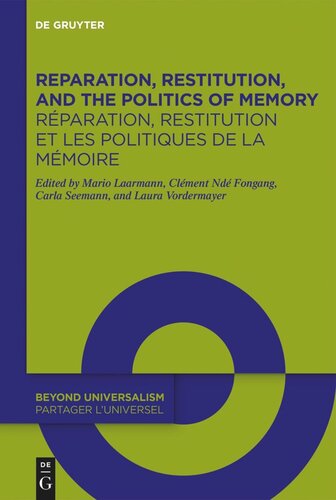

Most ebook files are in PDF format, so you can easily read them using various software such as Foxit Reader or directly on the Google Chrome browser.
Some ebook files are released by publishers in other formats such as .awz, .mobi, .epub, .fb2, etc. You may need to install specific software to read these formats on mobile/PC, such as Calibre.
Please read the tutorial at this link: https://ebookbell.com/faq
We offer FREE conversion to the popular formats you request; however, this may take some time. Therefore, right after payment, please email us, and we will try to provide the service as quickly as possible.
For some exceptional file formats or broken links (if any), please refrain from opening any disputes. Instead, email us first, and we will try to assist within a maximum of 6 hours.
EbookBell Team

4.0
96 reviewsOpen Access
Over the past roughly two decades, the interconnected concepts of reparation, restitution, and commemorative culture have gained renewed momentum – in academic discourse as much as in activist, artistic, and political contexts.
This development insists on a critique of the material and systemic conditions of societies and global relations. In their 2018 report on the restitution of looted cultural artifacts, for example, Bénédicte Savoy and Felwine Sarr discuss restitutions in the light of a new ethics of relations. Individual acts of restitution, but also the processes of material and immaterial reparation that go with them, are viewed as mediators in the by definition irreparable legacy of colonialism and its present repercussions. A new ethics of relations might even go beyond anthropocentrism: The destruction of nature in the Anthropocene and the destruction of humanity that is colonialism both require a fundamental questioning of the premises of western modernity and a radically different relationship to the world.
The present volume aims to examine different discourses and practices of reparation, bringing together perspectives from cultural studies, memory studies, post- or decolonial studies as well as literary studies. Chapters from these disciplines are complemented by contributions from the fields of philosophy, art, and literature in order to explore the multiple facets of reparation.
With contributions by Kader Attia, Lucia della Fontana, Ibou Coulibaly Diop, Alexandre Gefen, Hannah Grimmer, hn. lyonga, Helena Janeczek, Markus Messling, Clément Ndé Fongang, Aurélia Kalisky, Fabiola Obame, Angelica Pesarini, Aurore Reck, Olivier Remaud, Patricia Oster-Stierle, Sahra Rausch, Igiaba Scego, Ibrahima Sene, Christiane Solte-Gresser, Jonas Tinius.